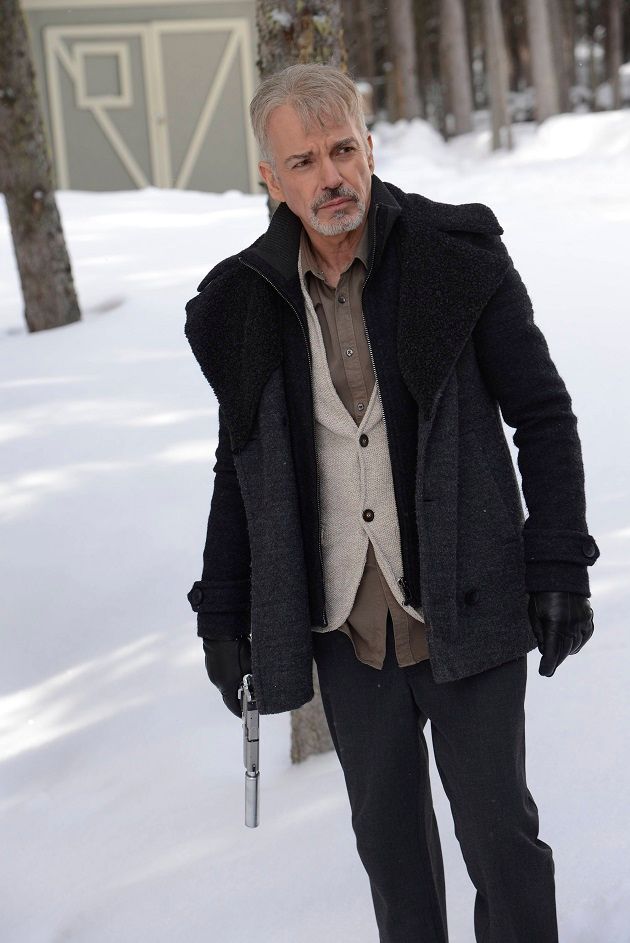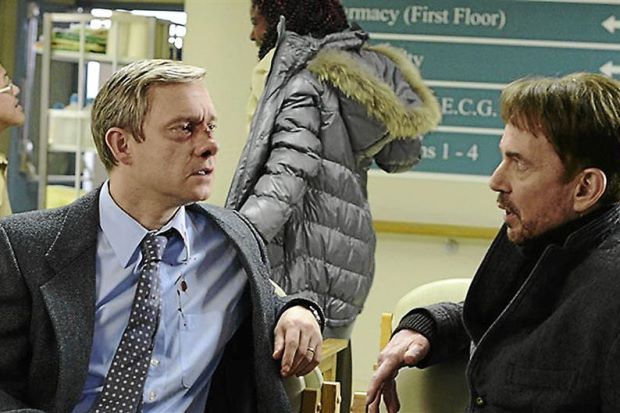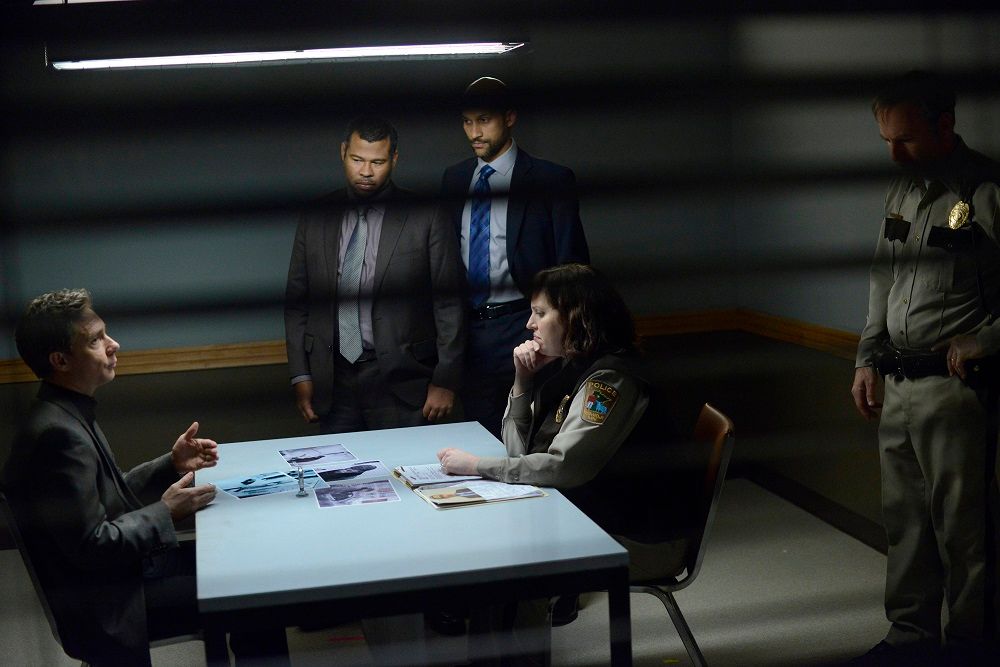Although Billy Bob Thornton starred in Joel and Ethan Coen’s The Man Who Wasn’t There and Intolerable Cruelty, he may end up being best remembered by their fans for his role in the television series based on their work.
FX’s Fargo reaches its finale tonight, and at its center is Thornton's mystifying hitman Lorne Malvo. Ahead of the episode that draws all of Malvo's crimes together, Spinoff Online and other outlets spoke with Thornton about the character's talent for unleashing the will of others, his lack of a past, capturing the style of the Coen brothers, and whether the ending can satisfy.
"People say he’s like the devil. I think he’s more like God and the devil," Thornton said. "I think it’s almost as if, whether he knows it or not, Malvo is there to facilitate people’s true selves. It’s like he brings out in people who they really are. He’s very impatient with people who are stupid or if they’re ridiculous. Malvo likes to get to the root of what everything is about and sometimes he has to mess with people in order to do that."
With Malvo returned to the small Minnesota town where his murderous ways set many of Fargo’s events in motion, questions hang over which of the series regulars will survive – including him. But the actor had little to offer in terms of specific events to watch for.
"It’s the kind of show where you can’t even tease at all really, but in terms of the arc of not only my character, but everyone’s, I think people will be very satisfied," he said. "I think Noah [Hawley] wrote a terrific 10-hour movie. It really has a beginning, a middle and an end, and that was one of the things that appealed to me about it. It’s just very well thought-out and I was very happy with it."
Thorton declined to build up a backstory for his blank slate of a mob hitman, explaining, "I think it’s probably the only character I’ve ever played, frankly, that has no — not only a conscience, but he has no backstory in the story. So I chose to not think about that because Malvo, he’s an animal, and animals are eating machines. I thought if I come up with a backstory and it’s like 'His father locked him in a shed when he was little' or something, that might cause too much emotion for the character. It might give me too many reasons to do things and I didn’t want to do that, so it’s the first time I’ve ever not had a backstory in my head or otherwise."
What he did work to do was define Malvo physically, making his mannerisms match the unsettling feeling he gives other characters. "After years and years of injuries and weighing 140 pounds, I look like Homer Simpson’s boss to start with," he laughed. "My physicality, so some of it is just natural. But I did choose to be very sort of slinky and sort of — I just sort of appear from places. I did choose to be very quiet, but not like purposely menacing like the guy who twirls his mustache. Malvo even acts like he’s a pal to people sometimes, especially Lester. That was conscious to make him not the typical bad guy, who screams a lot and grits his teeth and grabs people by the collar. That was a conscious choice."
Speaking of Lester, Martin Freeman's insurance salesman turned world-class murdering heel, the connection between the two men forms the spine of the series in many ways for Thornton. He said that even if Lester hadn't pressed the killer into acknowledging him in Vegas last week, Malvo likely still would have returned to Minnesota. "I think Malvo is kind of like a cat with a mouse," the actor explained. "I think the temptation would have probably been too great [not to walk away]. I’m not sure he could have left him alone. It is, 'Are you kidding me here? We are in the same place in Las Vegas; I’ve got to do something about this.' Plus this whole thing is more like ... I think a lot of this is about faith. You always think about if I’d only gotten on my motorcycle two minutes later, then I wouldn’t have hit that deer or whatever it is. Malvo is kind of the spirit that makes all those things happen, sort of lines up people’s faith for them.
"I really enjoyed the scenes that I did with Martin," Thornton added, addressing his Fargo highlights. "There’s a scene in a little café where I tell him about how he needs to be a man and step up and realize that we were once apes. I like the opening scene where he and I meet each other in the lobby of the waiting room of the hospital, the scene with myself and Colin Hanks at the end of the pilot where we first meet each other in the car. I remember those as particularly good moments. I remember feeling completely lost in them that we were really there, but I have to say all the stuff we did just felt really good.
"I’ve particularly enjoyed working with Keith Carradine in the one scene we’ve had so far in his diner. I’ve always wanted to work with Keith, and it was just a real — you could feel two actors disappearing into their characters in that scene. I remember coming out of it as if I’d actually been through something; it was really, really easy working with Keith and just looking at him as this guy."
While Fargo takes many of its cues from the Academy Award-winning Coen brothers classic of the same name, Thornton said that any fears he had of the project turning derivative were allayed after his initial reading of Hawley's script. "When I read the pilot script, I could see how good it was," he said. "I think if I had just heard about the idea without having read it, I think maybe I would have been a little more worried about it. But as it turns out when they met with me and offered me the role, I read it right away. That dispelled any concerns I might have because it almost looked like it was written by the Coen brothers to me. It was very, very much like the movie in that way, so yes, I thought Noah really hit the mark."
Thornton did say that the Coens deserve maybe more credit than they get for the project simply for the audacity of their careers – how the darkly comedic tone of their movies was so absent from pop culture before they arrived.
"I think something that’s been overlooked a little bit throughout our press for this show there’s been a lot of talk about how we’ve created a whole new animal, even though it’s based on the movie. The Coen brothers didn’t write any of it. It’s been just our thing and its own show, and all we took from Fargo was the snow and the general idea,” he said. “But something that I think has been overlooked a little bit and not talked about enough is that if it weren’t for Joel and Ethan Coen, we wouldn’t be here. They created a whole new genre practically for movies. It’s not that nobody else had that dark sense of humor and nobody else had thought about these kinds of things in their mind before. Otherwise the Coen brothers wouldn’t have any fans, but all those people who had that sensibility, they hadn’t done it yet. The Coen brothers are the first to do it ... They’re the ones who really created this world and I just have to say that because I think sometimes that’s overlooked, that we wouldn’t be here if it weren’t for them. They set this tone and deserve the credit for us even having this show."
He added that while working on last week's episode with another Coen regular, Stephen Root, they didn't have to talk about the brothers' influence because that style is naturally ingrained in their actors. "I think that’s not a real tangible thing, that vibe, so you either know it or you don’t know it. I think you have it or you don’t have it,” Thornton said. “I think the important thing is you pick actors who just are it. Stephen and I didn’t really talk about it much. We said 'If you say hello to Joel and Ethan, tell them I said hello' and that kind of stuff. We didn’t really discuss it too much, because on the schedule we had, we were moving and he was so funny as that character that I was wrapped up in him anyway, just seeing him as that guy.
"But the Coen brothers’ tone and their vibe is like a liquid thing; you can’t really say. If you’re doing an action movie and you’re playing some cartoon hero, I think you have something to discuss; but I think in a Coen brothers’ style thing, there’s not much you can discuss about it. It’s just as I said, you either have that vibe or you don’t have it."
Whether Fargo’s end will have the traditional Coen flourish of pathos and pathetic circumstance, remains to be seen. But Thornton feels the show delivers, whether or not a mystery is unraveled for the viewer.
"We kind of have known all along that I’m the devil in it, and it’s kind of the way Hitchcock did thing,” he said. “He always thought it was scarier when you knew from the opening frame that’s the bad guy; that way the audience is afraid every time he’s around, so it’s not like the butler did it or something like that. I’ll just say it’s a very well thought-out series and very well-rounded and I think each character does have an arc and an A, B and C."
Fargo's finale airs tonight at 10 ET/PT on FX.




